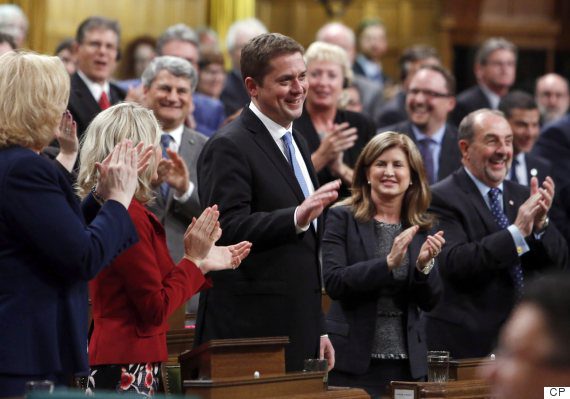The headlines everywhere are about how the "newly independent" Senate is suddenly obstructionist. It's a curious term considering that there is little evidence that they are actually holding up government legislation, nor have they outright defeated a single bill, but media narratives can be self-perpetuating, so maybe it behoves us to delve a little deeper into what is going on, so that we can sort out some of these rapidly metastasizing myths.
To begin with, amending bills are generally not actually being obstructionist. Yes, more bills are being amended now on the whole, but as a proportion of bills historically speaking, it's still on the low side. Amending bills is one of the primary functions of the Senate in its legislative capacity, and given that the government has accepted a number of those amendments would suggest that perhaps that those bills were indeed flawed the first time around.
But they didn't amend nearly as many bills under the Harper years, you might cry. Does that mean that the Trudeau government is drafting poorer-quality bills? The answer to that is no, because once Harper had a majority in the Senate, he used an illegitimate whip to ensure that his senators would pass bills unamended except in rare circumstances where they agreed that a legitimate error was made and had the opportunity to fix it as a government amendment. What you will find, however, is that a number of highly problematic (read: almost certainly unconstitutional) bills were passed, but that the Senate committees would end up attaching "observations" to the bills so that there was a record that the problems were identified, so that when that legislation was challenged before the courts and much of it was there was a record that Parliament did find problems, even if they didn't have the votes to amend it.
This is an important step that people overlook the need for there to be a record so that when a court has to decide what the will of parliament was in passing a bill, and that is a consideration that comes up an awful lot when judges are asked to interpret laws, they need to know what the discussion was. It's also one of the reasons why the Senate has held additional hearings into bills that the House of Commons sped through the process, like the trans rights bill. Senators knew that the legislation would inevitably be challenged in the courts, so they made sure to hear from the bill's opponents so that there was a record that they'd heard the concerns and dismissed them. It wasn't about validating those points of view, nor was it about "obstructing" the swift passage the legislation. It was about ensuring that the process was followed properly because it matters when these things wind up before the courts.
The "obstructionist" narrative has recently been applied a great deal with the budget implementation bill, mysteriously given that the bill hadn't even been debated for three days when the headlines started saying that it was "stuck" in the Senate, or that they were "holding it up." There was a legitimate debate to be had about whether the Senate has the power to split bills deemed to be omnibus (and most budget implementation bills are omnibus by nature the debate tends to fall on whether it's an abuse of omnibus powers or not), and the fact that this motion came to the floor of the chamber suddenly had the country's pundit class reaching for their pearls, and possibly swooning onto a fainting couch. How dare they touch a budget bill! Err, except the very first bill of this parliament, being the Supplementary Estimates, a money bill, was sent to the Senate without crucial financial schedules and needed to be sent back, which was them catching the Commons' mistakes yet again. Like they're supposed to.
As for who is doing the "obstructing," the numerical breakdown has shown that it is largely the Conservatives in the chamber (not a surprise the opposition is supposed to oppose), as well as the Senate Liberals, who are not giving their ideological fellows a free ride when it comes to the legislation they're putting forward. But the Senate Liberal objections may have deeper meaning than most people see on the surface.
One of the ongoing issues with the Senate is the persistent concern that there is an attempt to abandon its Westminster character and to abolish the official opposition, so that you will eventually have a chamber that is either full of 100 "loose fish" at worst, or a handful of small interest groups that qualify under the new caucus rules at best, rather than partisan groupings. Not only would that be a very bad thing for accountability going forward, as ideological scrutiny is just as important as legislative scrutiny, but it weakens the Senate's overall functionality.
With so many new appointments that are in the "independent" category who, despite their enthusiasm to put their own stamp on legislation, remain very deferential to the government and the House of Commons, and it is the more veteran senators who are trying to ensure that the freedoms and privileges of the Senate are not lost in the rush to non-partisanship. That so many were appointed at once stresses the ability of the Senate to integrate them effectively, replaying the travesty of the 2008 mass-appointment under Harper that brought in a number of new senators who were told from day one that they were subject to the whip of the PMO something that was out of bounds. While the new senators aren't being told they are under a whip, they are instead in danger of being susceptible to more insidious attempts to weaken the Senate's independence and ability to hold the government to account. If any of the attempts to resist this undermining of the Senate is seen as obstruction, then maybe we need a better calibration of the issues that are at stake. It's not about the passage of a few bills it's about the health of a vital parliamentary institution going forward.








